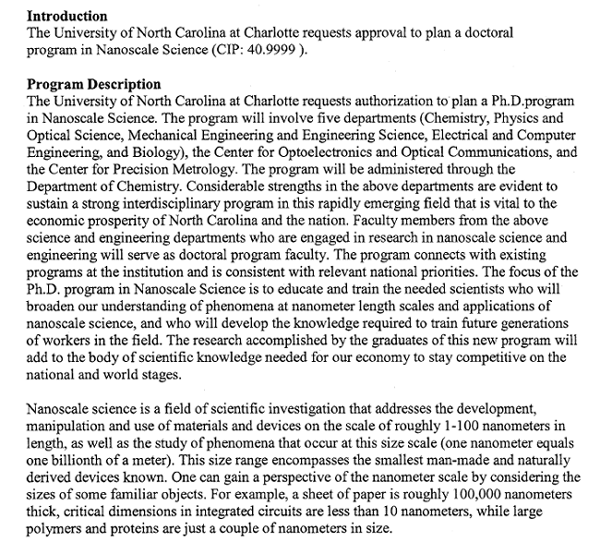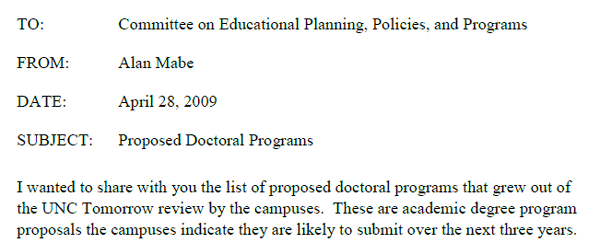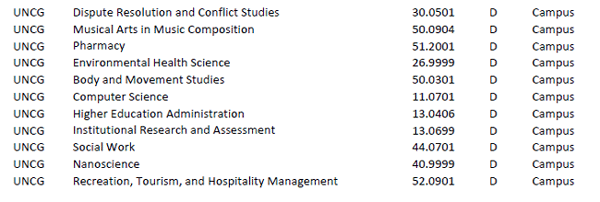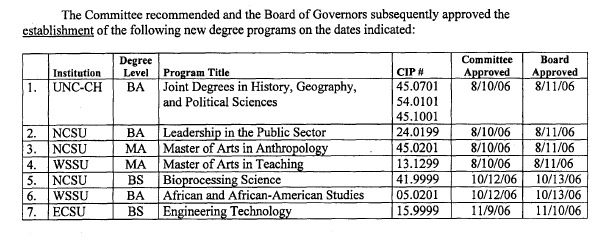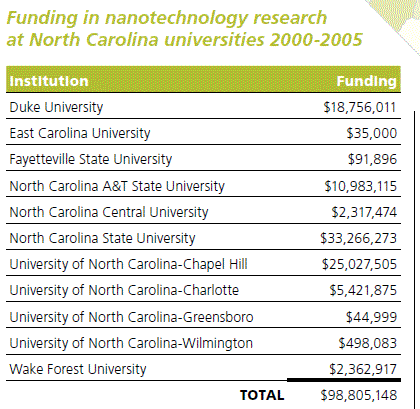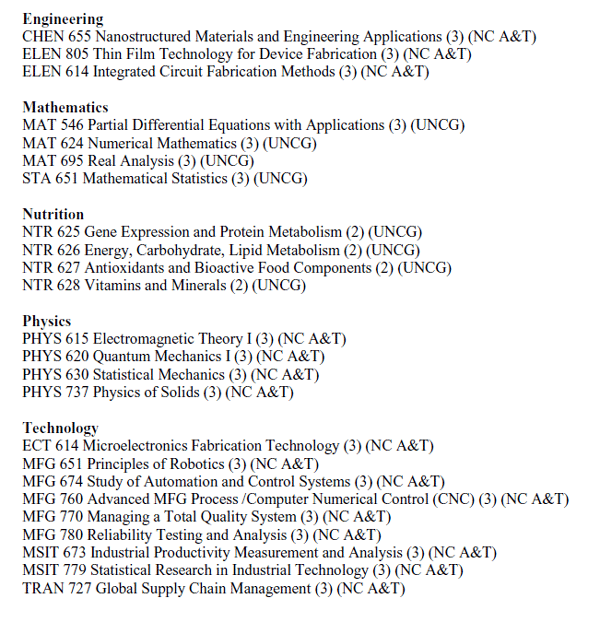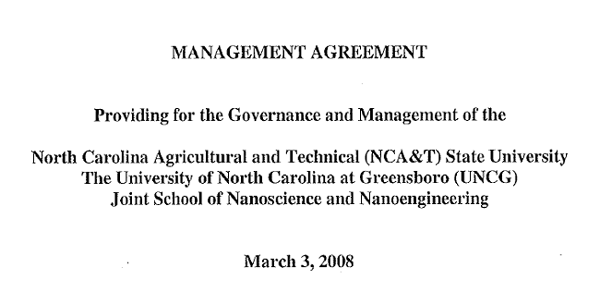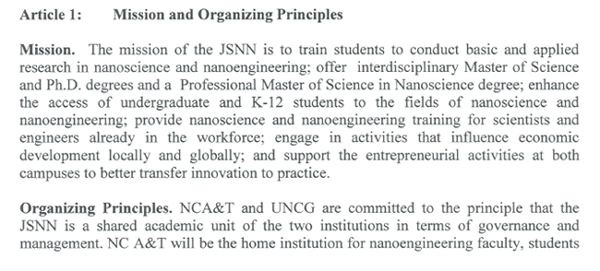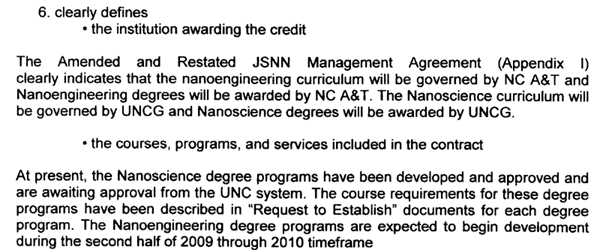|
|
| |
Fraudulent claiming HBCU NC A&T and
HWI UNCG were partners in NCA&T/UNCG
Joint Millennial Campus. May 2007
UNC Board of Governors established
alleged Joint School of Nanoscience
and Nanoengineering, at bogus NC A&T
/ UNCG Joint Millennial campus
Gateway University Research Park,
to offer (a) joint interdisciplinary
Ph.D. degree and (a) joint
professional science master's
degree.
|
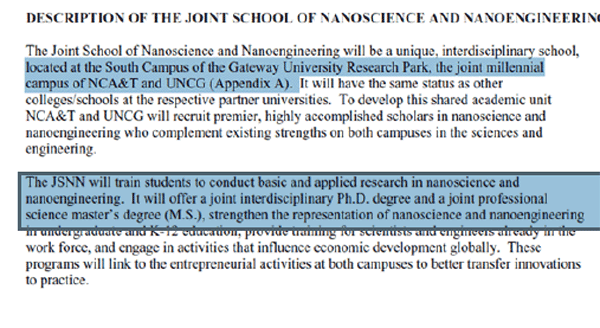 |
|
| |
|
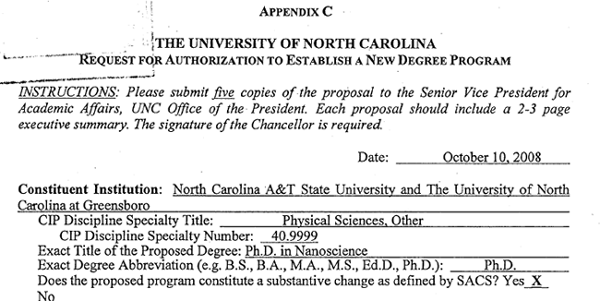 |
| |
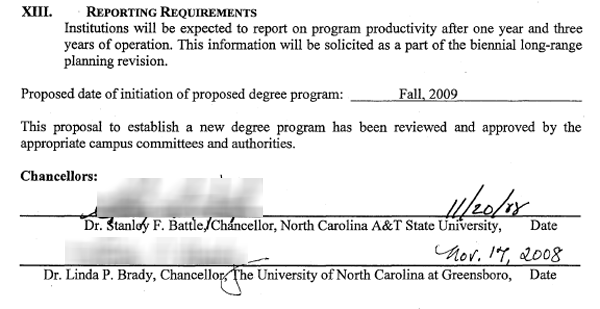 |
|
NC
A&T and UNCG submitted
Chancellor signed Request for
Authorization to Establish a New
Degree Program , joint Ph.D. in
Nanoscience CIP 40.999 dated
October 10, 2008 and joint
Master of Science in
Nanoscience CIP 40.999 dated
November 21, 2008 to UNC
General Administration.
Two programs with
the same CIP code should
initially be viewed as
duplicative. [UNIVERSITY
OF NORTH CAROLINA PROGRAM
DUPLICATION STUDY James H.
Woodward November 1, 2011, p.5] |
|
| |
|
| Notwithstanding
May 2007
UNC Board of Governors established
alleged Joint School of Nanoscience
and Nanoengineering which was to off
a joint interdisciplinary Ph.D.
degree and a joint professional
science master's degree. |
|
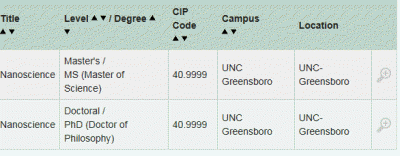 |
| |
|
The University of North
Carolina Board of
Governors established
(non-joint) stand-alone
MS in Nanoscience on
November 13, 2009, and
PhD program in
Nanoscience on January
8, 2010 to HWI UNC
Greensboro;
in which UNCG students
will be given the
opportunity to take
relevant courses at the
School of Engineering
at North Carolina A&T
University and will be
able to work on
collaborative projects
with faculty in the
School of Engineering” -
excluding HBCU (The)
North Carolina
Agricultural and
Technical State
University which has an
Engineering School. |
|
|
| |
|
 |
 |
| |
|
Examining Nanoscience
discipline file at
www.northcarolina.edu
:
1.
The discipline file
contained no UNCG
Notification to plan a
master’s in Nanoscience,
2.
The discipline
file contained an
unsigned
“Revised UNCG Request to
Establish a Master’s in
Nanoscience,
3.
The discipline file
contained no UNCG
Request to plan a PhD in
Nanoscience
4.
The discipline file
contained no UNCG
Request to Established a
PhD in Nanoscience |
|
| |
|
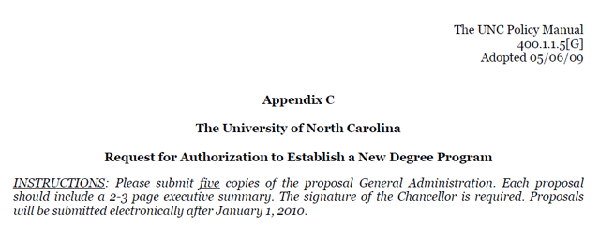 |
|
 |
|
Chancellor signature
certifies proposal [UNC
Policy Manual
400.1.5(G)] to establish
new degree program was
reviewed and approved by
the appropriate campus
committees and
authorities. |
|
| |
|
Responding to a Public
records request to Dr.
David H. Perrin UNCG
Provost & Executive Vice
Chancellor,1/7/11, for a
copy of an UNCG
chancellor signed
request to establish
stand alone Masters and
PhD Nanoscience degrees
at UNCG, Counsel
Steve Serck responded
"In
response to your request
of 1/7/11, no such
documents as you
described exists."
|
| |
|
|
Unambiguous lack of
UNCG Chancellor
Dr. Linda Brady signed
Proposals requesting to
establish Nanoscience
Professional Master of
Science in Nanoscience
and Ph.D. Nanoscience
clearly demonstrated
UNCG had not
expressed intentions to
establish the degrees;
they had not been
approved by the faculty
and administration, and
were not pursuant UNC
Policies
400.1.1,1[G]and
400.1.1.5[G]. |
|
| |
|
| |
|
| |
|
From Rebecca Adams
Sent: Tuesday, April
13, 2010 To Tom
Benberg; Sarah
Armstrong
Subject: Request for
interpretation of
accuracy of
nanoscience message
Please confirm the
accuracy of the
following message
which I intend to
send to the Provost,
Graduate Dean, Dean
of the Joint School
of Nanoscience, and
NC A&T's SACS
Liaison:
The bottom line,
however, is that we
need to submit a
full prospectus
(guidelines
attached) and need
to do so as soon as
possible. This
request will be for
approval to initiate
a new off-campus
site (South Campus)
and to initiate a
new degree program
(MS in Nanoscience)
at that site.
Contrary to previous
interpretations,
both represent
substantive changes.
Due to the
confusion, they are
willing to waive the
requirement that we
do so 6 months in
advance and will
usher it through the
approval process in
a timely way to that
we can accept
students into UNCG's
MS in Nanoscience
program next fall.
Jim
Ryan is already
working on a draft
of a prospectus, |
|
|
| |
|
| |
|
|
Alleged Dr. Alton Thomas and David
H. Perrin signed transmittal to Dr.
Belle Wheelan, President, COC dated
May 24, 2010, your letter dated
December 16, 2009, you stated that
UNCG and NCA&T had demonstrated
compliance with the Commission’s
Joint Curricular Ventures. ...This
Substantive Change Prospectus
provides additional information
about the Joint School of
Nanoscience and Nanoengineering
(JSNN) of North Carolina A&T State
University (NC A&T) and the
University of North Carolina at
Greensboro (UNCG), |
| |
| As advised during
an April 20, 2010 (10 a.m.)
conference call with SACS staff
(Sarah Armstrong, Tom Benberg, and
Marsal Stoll) and Joint School of
Nanoscience and Nanoengineering,
UNCG, and NC A&T contacts, we have
enclosed a full prospectus
requesting: |
- approval for UNCG to
initiate the PhD and MS in Nanoscience
on the South Campus of Gateway
University Park in fall 2010;
- a determination of
whether the MS and PhD in
Nanoengineering will represent a
substantive change for NC A&T, and
- (3) recognition of
the South Campus of Gateway University
Park as a non-contiguous part of both
campuses rather than as an off campus
site.
|
|
The information included in
the enclosed full prospectus supplements the
updated management agreement sent to you on
August 5, 2009. The University of North
Carolina Board of Governors approved the
establishment of the MS in Nanoscience on
November 13, 2009, and the establishment of
the Ph.D. program in Nanoscience on January
8, 2010. ..we have informed UNC General
Administration that we are moving forward
with our plans to offer these programs in
fall semester 2010 (classes commence on
August 16).
Approval to do so from
SACS Commission on Colleges is the last
necessary step in this process.
|
| |
|
The address where we
hope to offer the MS and PhD in
Nanoscience is:
South Campus, Gateway University
Research Park
2901 E. Lee Street
Greensboro, NC 27401-4904
|
| |
|
| |
|
|
Alleged, Dr. Belle Wheelan SACS Commission
on Colleges, letter dated June 25, 2010
to Dr. Alton Thompson (NCA&T) and Dr. David
H. Perrin (UNCG), thank them for
letter dated May 24, 2010 and prospectus for
the M.S. and Ph.D. degrees in nanoscience, a
part of the curriculum sponsored by the
joint venture of the two institutions housed
in the Joint School of Nanoscience and
Nanoengineering (JSNN) at two off-campus
instructional sites: |
| |
|
|
South Campus, Gateway University
Research Park 2901 East Lee Street
Greensboro, NC 27401-4904
|
North Campus, Gateway University
Research Park 5900 Summit
Brown Summit, NC 27214 |
|
| |
|
|
"We approve the M.S. and
Ph.D. degree programs in Nanoscience, shall
include them within the scope of
accreditation previously granted to the
University of North Carolina at Greensboro”
“We also approve the two
sites listed above as off-campus
instructional sites for the two institutions
for offering 50% or more of a program’s
credits.” |
| |
|
|
Since NC A&T offers approved
master's degrees in Civil Engineering,
Chemistry, Biology, Industrial Systems &
System Engineering, Electrical Engineering,
Mechanical Engineering, Computer Science,
Chemical Engineering, Physics, Computation
Science and Engineering, as well as doctoral
degrees in Energy and Environmental Systems
Engineering, Computational Science and
Engineering, Electrical Engineering,
Mechanical Engineering, and Industrial and
Systems Engineering, the proposed programs
do not appear to be significant departures
from the approved curriculum of NC A&T. We
accept the notification for the programs and
require no additional information from you. |
| |
|
The
nanoscience programs will begin August
16,2010, The M.S. and PhD. degree programs
in nanoengineering will begin fall 2012.
A management agreement stipulating the
organizational principles, approaches, and
protocols has been formulated and executed
by the chancellors of the two partner
institutions. JSNN has two departments: The
Department of Nanoscience at UNCG and the
Department of Nanoengineering at NC A&T.
nanoscience faculty and staff will be UNCG
employees and nanoscience students eill be
UNCG students. UNCG will award the
nanoscience degrees; NC A&T will award the
nanoengineering degrees. UNCG is responsible
for financial management; NC A&T is
responsible for administering
facilities-related issues.
Instructional delivery will be traditional
classroom delivery. The curriculum and
student learning outcomes for the M.S.. and
Ph.D. degrees in nanoscience appear
appropriate with 33 hours required for the
master's degree and a minimum of 60 hours, a
qualifying exam and a dissertation required
for the Ph.D. degree. |
| |
|
Voice and email traffic with
Sara Armstrong, Commission Substance Change
Specialist and participant in UNCG MS and
PhD Nanoscience authorizations
determination; established UNC-Greensboro
M.S. and PhD. Nanoscience authorization were
pursuant SACSCOC COLLABORATIVE ACADEMIC
ARRANGEMENTS: POLICY AND PROCEDURES as a
dual educational program with NCA&T. |
| |
| A dual
educational program is one whereby
students study at two or more institutions,
and each institution awards a separate
program completion credential bearing only
its own name, seal and signature. Emphasis
added. |
| |
| |
|
Dr. Sara Armstrong:
“The “program” is a cooperative
venture by which the two
institutions share facilities,
equipment and other resources,
called the Joint School of
Nanoscience and Nanoengineering
operated by University of North
Carolina Greensboro (UNC-G) and
North Carolina Agricultural and
Technical State University (NCATSU).
Four degrees are offered: |
| |
|
-
At UNC-G: Master of Science and
Doctor of Philosophy in
NanoScience (began Fall, 2010)
-
At NCATSU: Master of Science and
Doctor of Philosophy in
Nanoengineering (to begin Fall,
2012)
|
|
| |
| SACS
COLLABORATIVE ACADEMIC ARRANGEMENTS POLICY
Collaborative academic arrangements are
agreements between institutions purposes
of awarding academic credits and/or
educational program completion credentials,
e.g., certificates, diplomas, degrees or
transcripts. |
|
|









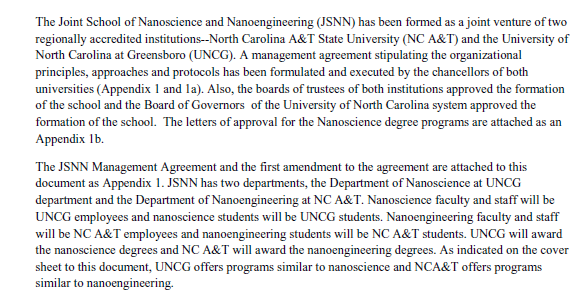








 Commission
June 24, 2010 only approved substantive change
was Eastfield College, Mesquite, Tex. off-campus
instructional sites at South Garland High School
and Lakeview Centennial High School.
Commission
June 24, 2010 only approved substantive change
was Eastfield College, Mesquite, Tex. off-campus
instructional sites at South Garland High School
and Lakeview Centennial High School.
